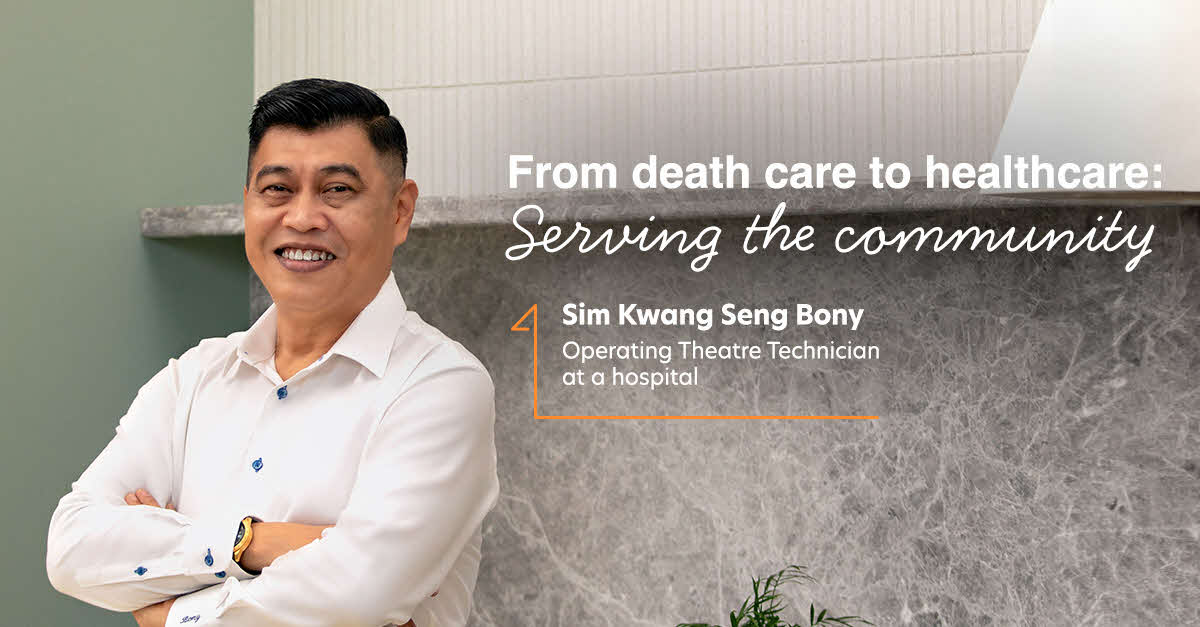
The year was 2021, and the COVID-19 pandemic had disrupted many industries, leading to massive layoffs.
Sim Kwang Seng Bony, 58, who was nearing his 23rd year as an embalmer, was experiencing a sense of inertia and stagnation in his career. His job required constant interaction with the bereaved and deceased, demanding emotional strength and resilience. Although he enjoyed his work, he wanted to explore other ways to serve the community.
During this time, there was a growing demand for healthcare workers, whose sacrifices and dedication profoundly inspired Bony. “I thought I was an essential worker, but (the healthcare workers) were the real, unsung heroes,” he remarked.
Eager to embark on new paths, Bony decided to make a bold leap into the healthcare sector, in hopes for a more fulfilling career.
Caring for the living
To embark on his healthcare career, he signed up for the SkillsFuture Career Transition Programme (SCTP) with the HMI Institute of Health Sciences. As a social enterprise that supports individuals seeking mid-career transitions to healthcare, HMI Institute used teaching methods tailored to adult learners who had been out of the educational system for a long time, making the transition smoother for Bony.
With a hands-on learning approach and opportunities to go for clinical attachments at hospitals, Bony was able to gain valuable practical experience. Under the mentorship of trainer Loh Wan Ying, who has over 15 years of nursing experience, he successfully graduated with a (SCTP) WSQ Higher Certificate in Healthcare (Nursing) with Perioperative Specialisation.
Having transitioned successfully into the healthcare industry, Bony now works as an operating theatre technician. His daily responsibilities include setting up the operating theatre, preparing equipment and instruments, and putting patients at ease as they prepare for their procedures.
Finding Purpose
Despite his success story, Bony’s career switch hasn’t been easy. The initial uncertainty was daunting, as he faced an income loss for five months.
Adapting to new technologies and learning to use electronic equipment was a significant struggle for Bony. He found it completely alien, likening himself to “an old dog who had to learn new tricks.”
He also had to adjust to long working hours and the physically demanding nature of the job. Tasks such as standing for extended periods, turning patients every two hours, and caring for those with limited mobility required considerable effort. To prevent injuries, Bony had to take extra care of his spine and back.
However, despite the hardships, Bony finds great satisfaction and fulfilment at this role in the hospital “I enjoy seeing my patients improve day by day and when they get discharged, I feel happy knowing that they can be home with their loved ones. Here, I finally understand what real compassion means,” he shared.
A Vision for the Future
With technology and jobs evolving at such a fast pace, Bony believes it’s important to constantly upgrade himself.
“I told my children that maybe 10 years down the road, they might be working in jobs that don’t even exist today—like a tour guide in space!” he said.
Having made the switch to find purpose, Bony advises jobseekers, “If what you’re doing isn’t fulfilling or if an industry intrigues you, go for it. There are many possibilities; don’t ever limit yourself.”
Bony aims to become a fully-fledged nurse and has recently enrolled in a Career Conversion Programme under the Institute of Technical Education for nursing. “Some of the nurses at the hospital are above 70. I believe I can go on for a decade more,” he said.
